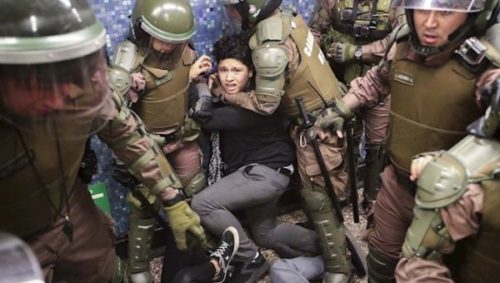At this point, the whole world knows: Chile is on fire. When right-wing President Sebastián Piñera announced a subway fare hike of 30 pesos, the Chilean student movement sprung into action, occupying subway stations and calling on the rest of the population to protest. In the face of intense repression by the police, the Chilean population rose up through mass social media support for the protests, the banging of pots and pans (also known as cacerlozos), taking the to streets and even barricading streets.
Piñera was forced to retreat. He rescinded the 30-peso fare hike. But, as the popular hashtag indicated, #ChileDesperto (Chile woke up). It wasn’t about 30 pesos. It was about 30 years of neoliberalism and the remnants of the military dictatorship that remain: private healthcare and education, low salaries, underemployment, a highly repressive state and more.
This isn’t the first time that Chilean students have risen up. It seems that each generation of students engages in mass mobilizations that rock the country, including the “revolt of the penguins” in 2006 and the massive protests in 2011 and 2012. But this time, the entire population and, importantly, the working class and labor unions have joined.
In response, Piñera has instituted a number of repressive mechanisms, implementing a curfew for the first time since the military dictatorship and unleashing military tanks on the Chilean people. Of the protesters, he said, “We are at war against a powerful, implacable enemy who respects nothing and no one and who is willing to use violence and crime without any limit, even when it means the loss of human life, with the sole purpose of producing the greatest possible damage.” What Piñera did not mention is that the people who have died so far were protestors killed by the police*. Nor did he mention the protesters who were sexually assaulted by the cops. There are countless videos of police pointing guns at protesters, beating up people in the street and dragging away children with bloody noses.

Piñera’s repressive tactics that were meant to scare people into staying at home have only added fuel to the fire. The images are incredible: subway stations on fire next to elderly people banging pots and pans. Hundreds of thousands in the streets. Children participating in the cacerolazos from their home.
Despite massive mobilizations led by students throughout the weekend, the unions stalled on calling for a general strike until Tuesday. At first, union and student leadership only called for a strike “to empty the streets” but massive mobilizations across the country on Monday increased the pressure on the unions to call for an active strike.
Port workers who were demanding a general strike have, meanwhile, been organizing their own strikes, paralyzing 20 of the most important ports in the country. The workers of La Escondida copper mine, the most important mine in the world, have also called for mobilizations. In their statement, they say, “Our union organization will not accept abuse or repression from employers or their government, even less so when the repression affects the children of workers who protest against an unjust system that has been imposed by those who govern today. We call on all the mining workers in our country to protest against the repression exercised against the People and abuses by employers.”
On Tuesday, in a press conference with Chile’s most important unions, the student federations, and social movements and other organizations announced a general strike for Wednesday and Thursday. Some of the unions in attendance were healthcare workers, teachers, and dockworkers, as well as a workers’ organization against the privatization of pension funds.
The demands are:
1) immediate repeal of the state of emergency and the return of the military to the barracks
2) a call to members of Parliament to go on a legislative strike for the duration of the state of emergency, refusing to vote on any bill
3) the withdrawal of all bills that negatively affect workers and the general Chilean population, such as pension cuts and tax reforms
4) implementation of economic emergency measures
5) formation of a National Constituent Assembly to create a new Chilean Constitution that would create new structures and “a new model of national development that puts an end to the current neoliberal model.”
6) rejection of Piñera’s statements that he is “at war” against the people of Chile and a demand for his resignation
The unions have called for mass mobilizations on Wednesday and neighborhood-based mobilizations on Thursday. That there are active strikes called for by all of the major unions is a victory for the rank and file.
These demands also address some important issues for Chile. In particular, the National Constituent Assembly points to a problem that is deeper than just one President. It sees the problem as the regime established in the transition to democracy after the military dictatorship. The progressive demands put forward by the unions demonstrate the depth of this crisis: the masses are sincerely questioning Chile’s regime to its very core.
But how will a two-day general strike win a Constituent Assembly and the resignation of the president? As they say explicitly in their press conference, the unions see the general strike as a maneuver to pressure the government to enter into a dialogue with union leaders. This is an essentially different strategy from building a general strike whose goal is to oust the current government. There is a difference between a Constituent Assembly based on the existing leadership of political parties, the union and the social movement bureaucracy and one that is built from below, based on the assemblies of workers, students, and the general population in struggle.
The Party of Revolutionary Workers, a Chilean socialist group, says,
This call opens a favorable scenario for the intervention of the workers and mass movement. It has progressive demands such as the ‘out with Piñera,’ an end to the state of emergency, the Constituent Assembly, and emergency social measures such as salaries and pensions. However, it does not propose to overthrow this anti-popular and authoritarian government in the streets, but to ‘pressure’ for the government’s ‘dialogue’ with social organizations. This is an institutional solution with the old parties and institutions of the regime to ‘recompose democratic institutionality.’
As the Party of Revolutionary Workers notes, there are no spaces to democratically discuss and decide on next steps by those who are in the midst of this struggle. According to them, the unions “refuse to organize spaces of democratic coordination, such as assemblies and committees of struggle with delegates from places of study and work. This is needed to provide continuity to the strike in order to overthrow this government, which is entirely on the table right now. We demand open assemblies this Friday to discuss the continuity of the strike and a plan of struggle.” (Read the full declaration here.)
Piñera is Scrambling
Today, in a desperate bid to stem the tide of protests, Piñera’s administration attempted to hold meetings with his opposition, including the Socialist Party, the Communist Party, and the “Frente Amplio” (Broad Front). None of these parties attended the meeting, although, until the last minute, the Frente Amplio considered attending.
It is unacceptable even to think of sitting down with a government responsible for killing more than 15 of its people, and which continues to repress and criminalize the protests with the help of the military and the police—all while the masses are shouting, “Get the pacos and milicos off the streets.” (Get the cops and the military off the streets)
The Way Forward
On Monday, with their mobilizations that paralyzed the ports and mines, the port workers and miners gave us a small taste of the only way the defeat of the Piñera government and the political regime is possible. The millions of Chileans who have joined the protests need a free and sovereign Constituent Assembly based on grassroots mobilization in order to provide a structural response to this enormous crisis in Chile. It must be based on democratic assemblies built in workplaces and places of study that refuse the crumbs that a cornered government will seek to deliver to Chileans.
But a Constituent Assembly should not be socialists’ final goal. As the Party of Revolutionary Workers states,
We know that the great powers and corporations will defend their privileges and interests tooth and nail and will oppose the measures taken by a truly Free and Sovereign Constituent Assembly. That is why we must move forward with the establishment of assemblies and coordinating committees wherever the forces to confront this resistance of the bosses and their parties arise, so we can open the way to struggle for a government of the workers that breaks with the capitalists and that allows us to achieve our social and democratic aspirations.
*The government claims that 15 people have died. Human rights organizations say the number is nearer to 45.











